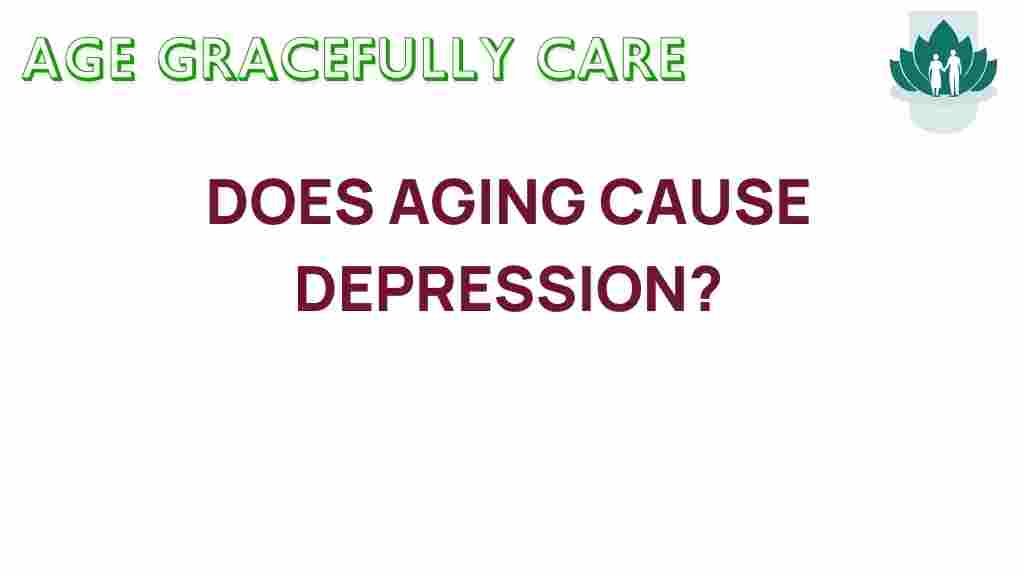Unraveling the Link: Does Aging Fuel Depression?
Aging is a natural process that every individual experiences, and it often brings a myriad of changes, both physical and psychological. As we grow older, our bodies and minds undergo transformations that can impact our mental health. One pressing concern that emerges with age is the prevalence of depression. In this article, we will explore the intricate relationship between aging and depression, examining the psychological effects of aging, the importance of emotional well-being, and how elder care can provide critical support to seniors.
The Psychological Effects of Aging on Depression
The journey of aging is often accompanied by significant life changes that can affect emotional well-being. These changes may include retirement, loss of loved ones, chronic illnesses, and decreased independence. Each of these factors can contribute to feelings of sadness and isolation, making seniors particularly vulnerable to depression.
Understanding the Connection Between Aging and Depression
Research has shown that older adults experience depression at higher rates than younger populations. Here are some key points to consider:
- Chronic Illness: Many seniors face chronic health conditions that can lead to feelings of helplessness and despair.
- Social Isolation: Aging often results in social networks shrinking, leading to loneliness which is a significant risk factor for depression.
- Loss: The death of peers and family members can create overwhelming grief, impacting emotional well-being.
- Cognitive Decline: Issues such as dementia or memory loss can cause frustration and sadness.
Age-Related Issues and Their Impact on Mental Health
As individuals age, they may encounter various age-related issues that can exacerbate feelings of depression. Understanding these issues is crucial for effective senior support.
Common Age-Related Issues
1. **Physical Health Decline**: As the body ages, physical health may deteriorate. This decline can limit mobility, leading to inactivity and further psychological distress.
2. **Cognitive Changes**: Memory loss and cognitive decline can lead to feelings of frustration and fear, which can trigger or worsen depression.
3. **Financial Strain**: Many seniors live on fixed incomes, and financial stress can be a significant source of anxiety and depression.
4. **Loss of Independence**: The inability to perform daily activities independently can lead to feelings of inadequacy and loss of self-worth.
Resilience in Aging: Building Emotional Well-Being
Despite the challenges associated with aging, many seniors exhibit remarkable resilience. Building resilience can significantly enhance emotional well-being and combat the effects of depression.
Strategies for Enhancing Resilience
- Social Connections: Maintaining relationships and engaging in social activities can combat isolation.
- Pursuing Hobbies: Engaging in meaningful activities can provide joy and a sense of purpose.
- Physical Activity: Regular exercise has been shown to improve mood and reduce symptoms of depression.
- Mindfulness and Meditation: These practices can help manage stress and promote a positive outlook.
Senior Support: The Role of Elder Care in Managing Depression
Elder care services play a vital role in addressing the emotional and psychological needs of older adults. These services can significantly reduce the impact of depression and promote better mental health.
Types of Elder Care Support
1. **In-Home Care**: Caregivers can provide companionship and assistance with daily tasks, reducing feelings of isolation.
2. **Community Programs**: Many communities offer programs designed for seniors, such as exercise classes, social clubs, and educational workshops.
3. **Mental Health Services**: Access to therapists and counselors who specialize in geriatric psychology can be crucial for addressing depression.
4. **Support Groups**: Connecting with peers who understand their struggles can be incredibly beneficial for emotional well-being.
Troubleshooting: Recognizing Symptoms of Depression in Seniors
It is essential for caregivers and family members to recognize the signs of depression in seniors, as they may not always express their feelings openly. Common symptoms include:
- Persistent sadness or low mood
- Loss of interest in activities once enjoyed
- Changes in appetite or weight
- Sleep disturbances
- Fatigue or loss of energy
- Feelings of hopelessness or worthlessness
Steps to Take if Depression is Suspected
If you suspect that a senior loved one is experiencing depression, consider the following steps:
- Open Communication: Talk to them about your concerns in a compassionate manner.
- Encourage Professional Help: Suggest they speak to a healthcare provider or mental health professional.
- Provide Support: Offer to accompany them to appointments or engage in activities that promote their well-being.
- Monitor Changes: Keep an eye on their mood and behavior for any significant changes.
Conclusion: Prioritizing Mental Health in Aging
Understanding the complex relationship between aging and depression is crucial for enhancing the quality of life for seniors. By acknowledging the psychological effects of aging, implementing supportive measures, and promoting resilience, we can help ensure that older adults maintain their emotional well-being.
Whether through elder care, community engagement, or personal relationships, it is essential to prioritize mental health in the aging process. By working together to provide the necessary support, we can significantly improve the lives of our seniors, allowing them to thrive in their later years.
For more information on mental health resources for seniors, visit NAMI for guidance and support.
If you’re looking for ways to enhance senior support in your community, check out various programs and resources available at this link.
This article is in the category Health and created by AgeGracefullyCare Team
